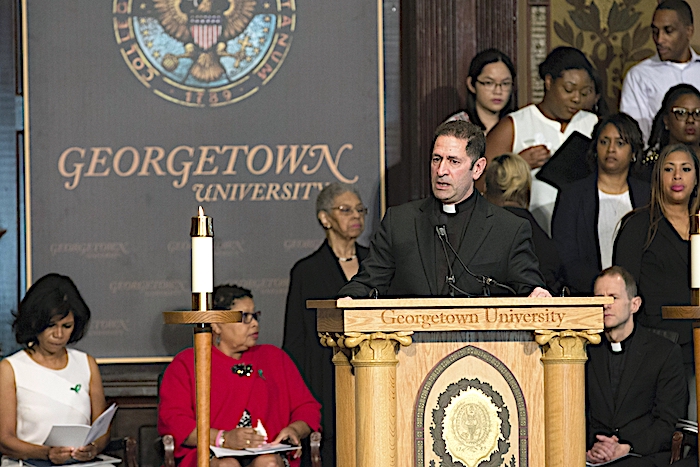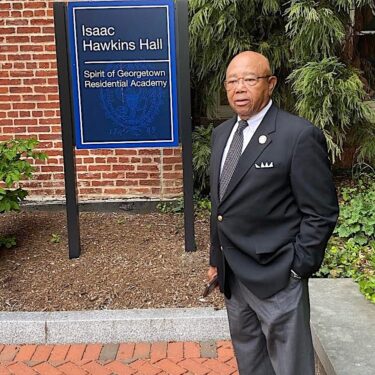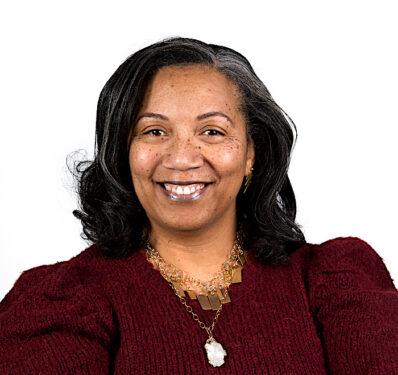
PROSPECT HEIGHTS — Father Tim Kesicki was a “scholastic” — the Jesuit term for seminarian — when he learned that the religious order he aspired to join had actively bought and sold slaves.
It was 1991 and the future Jesuit was taking a class at Xavier University of Louisiana’s Institute for Black Catholic Studies in New Orleans.
The subject, black Catholicism, was taught by a Benedictine monk, Father Cyprian Davis (1930-2015), who was a preeminent scholar in that field.
In an interview with The Tablet on July 14, Father Kesicki explained that the class prepared him for an early assignment serving black people in Detroit. His ordination was in 1994.
Still, learning about the history of Jesuits and slavery left an impression, if only initially.
“It was jarring to know that priests — and in particular, my religious order — were major slaveholders,” Father Kesicki said. “But we understood it as a lens through which to understand racism today — a historic sin.
“It informed my ministry in the African American community. But I would say that’s as far as it went.”
But years later, Father Kesicki was president of the Jesuit Conference of Canada and the United States. In 2016, the priests’ past with slavery became national news.
For example, The New York Times carried this headline: “272 Slaves Were Sold to Save Georgetown. What Does It Owe Their Descendants?”
In 2017, Father Kesicki very solemnly apologized to descendants of the “Georgetown 272” during a “Liturgy of Remembrance, Contrition, and Hope.”
The event, held at Georgetown, was intended to take responsibility for the Jesuits’ 1838 sale of 272 enslaved people to secure the university’s financial future.
“There was part of me that said, ‘My God, why, all of a sudden now in 2017, is this happening?’” Father Kesicki recalled. “But, then, I said, ‘Well, this is a great opportunity to confront a centuries-old sin with courage, and faith, and humility — trusting that’s where God is.”
Now Father Kesicki is chairman of the trust that feeds the Descendants Truth and Reconciliation Foundation.
The foundation was created in 2019 in a joint memorandum of understanding signed by the GU272 Descendants Association, Father Kesicki, and U.S. Provincials for the Society of Jesus (the Jesuits).
Also, the memorandum called for the establishment of a $1 billion irrevocable trust to fund educational scholarships and grants, emergency needs of elderly descendants, and programs to foster racial healing.
The Jesuits provided $15 million in seed money.
Last year, however, members of the descendants group complained that additional money promised by the Jesuits was not reaching the trust on the intended schedule.

Stewart complained that a small group of modern Jesuit leaders “maintain the position that they weren’t here during Jesuit enslavement, never enslaved anyone, and thus do not ‘owe’ anyone anything.”
He also urged Jesuits to deposit $57 million from the sale of plantation lands in 2009.
In an interview with The Tablet on July 12, Stewart said “those dynamics still exist.”
“We’ve always received resistance from some Jesuits who are in the power structure,” Stewart said. “But let’s qualify by saying some Jesuits. Because we’ve never received resistance from all Jesuits.”
Stewart noted that Father Sosa has repeatedly reaffirmed “he is committed to this objective of creating a moral pathway to truth and reconciliation for the sin that the Jesuits and the Catholic Church,” committed against the ancestors of today’s descendants.
“We do have positive things taking place for achieving the overall goal,” Stewart said.
For example, he noted, a $7 million “installment” was deposited to the trust earlier this summer, bringing the current total to about $22 million.
The foundation has begun a scholarship program to be administered through a partnership with the Thurgood Marshall College Fund.

Year one will provide $400,000 for annual need-based scholarships of up to $10,000 specifically to descendants of the 272.
The fund will pay the students’ costs directly to Historically Black Colleges and Universities (HBCUs) or other post-secondary institutions, Stewart said.
“This program will create life-changing opportunities for many,” Stewart said in a news release. “Effective education is our greatest opportunity to uplift the quality of life from one generation of descendants to all succeeding generations.”
“We still hope and pray to get more done sooner than later,” Stewart said. “But we are, in fact, moving forward.”
Stewart said he will soon step down as president of the foundation but he will remain in an “emeritus” capacity. His successor is Monique Maddox, an Edina, Minnesota-based entrepreneur in information technology.
Maddox and Stewart are both from Maringouin, Louisiana, where many nearby plantations purchased many of the GU272, including Isaac Hawkins. Both Maddox and Stewart count him as an ancestor.
Father Kesicki has also stepped down from the presidency and now focuses full-time on the “capitalization” of the foundation’s trust via fundraising and development.
“I wouldn’t say for a moment that it’s easy,” he said. “There’s divisions all over with regard to how to respond to slaveholding.
“On one end you have some people who say, ‘Slavery ended in 1865. Get over it.’ On the other end, you see people pushing for full-cash reparations.
“I don’t think people have come to a common understanding of the word, ‘reparations.’”
Father Kesicki said reparations should be about “repair,” and an easier way to achieve that is to instead focus on the term “reconciliation.”
To that end, he added, the descendants told the Jesuits, “‘We don’t want to directly benefit ourselves. Rather, we want to partner with you in investing in future descendants.’”
“I think that’s very powerful. I think that’s prophetic.”
It was essential, however, for the descendants to take the lead. Father Kesicki said.
He and Stewart both noted that this can be an example of how institutions — be they colleges, businesses, or religious denominations — can achieve reconciliation on slavery.
They said this individual case-by-case approach portends more realistic reconciliation than a government entity writing checks.
“I always get nervous when people say this is the Jesuit model of reconciliation,” Father Kesicki said. “No. Our model was to listen to the descendants and to partner with them on their vision.
“They said, ‘Look, Jesuits committed this historic sin. You can’t determine your penance, your restitution, you have to do that with us. You have to do that with us.’
“They don’t want to fight. That’s tempting, because this history is so shameful. But they say, ‘No, the only way we’re gonna get through this is if we do it together, and you trust us to lead.’
“That’s God.”

We did not ask for this 😒😒! Why haven’t the Jesuits spoken to the descendant community in 6 years? The Jesuits do not TALK to the descendant community. Father Kesicki only talks to Joe Stewart and his friends. Do not be fooled by this article.